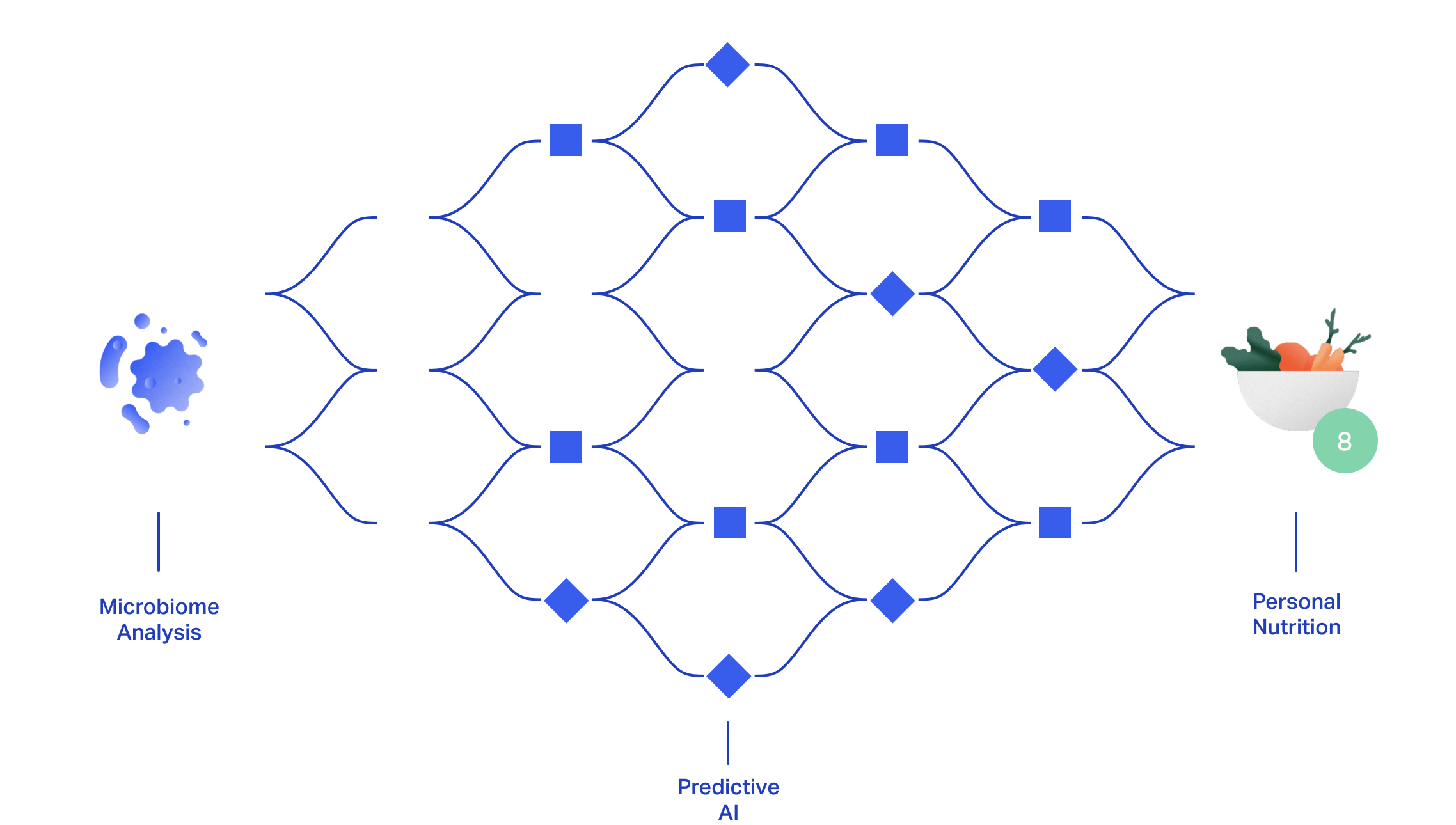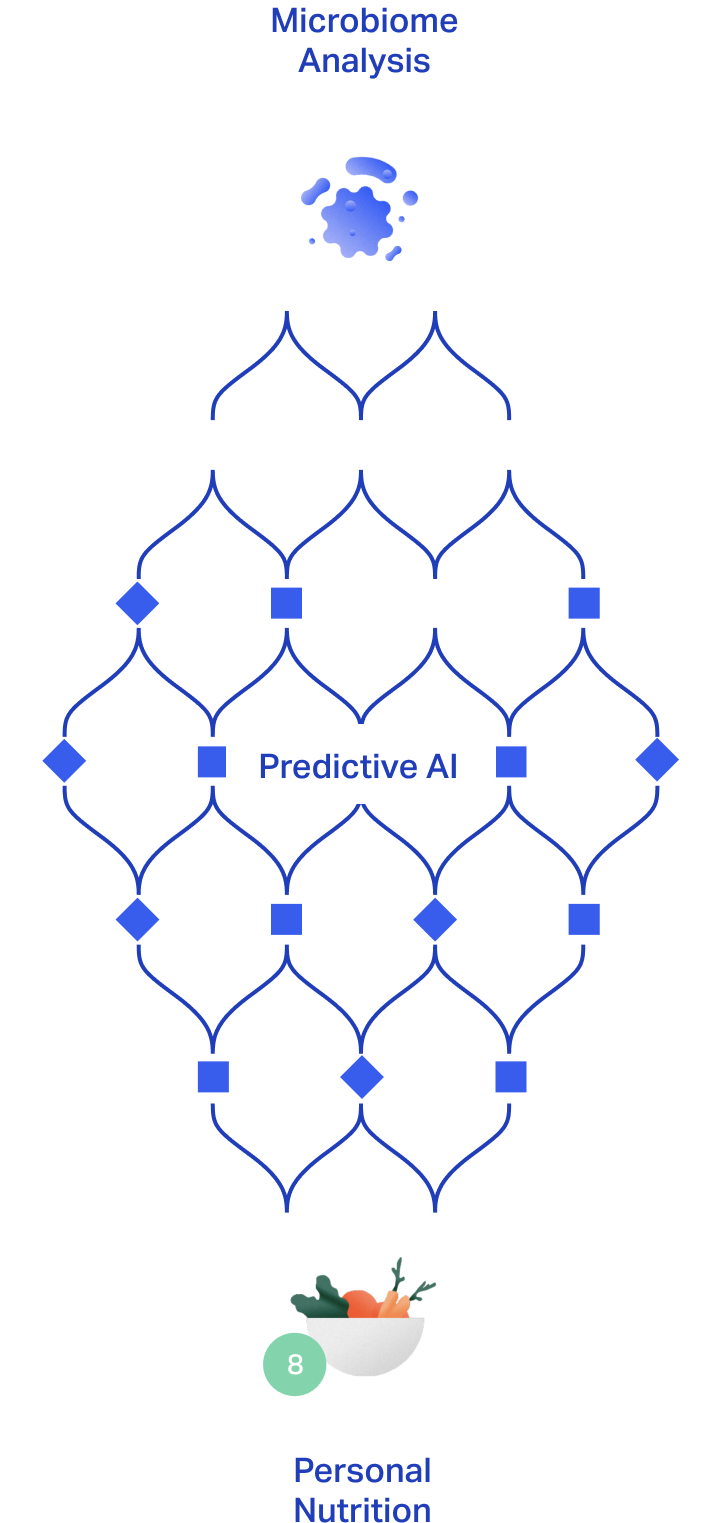

Your biology is unique.
Now your care can be too.
Your biology is unique. Now your care can be too.
At DayTwo, we predict blood sugar response before the first bite. That means members can make small, highly personalized food adjustments, like adding a few almonds to a bowl of ice cream, to avoid spikes. They can’t believe how easy it is.
Not finding us sooner.

What the Microbiome Discovery Platform Unlocks
With the right knowledge
about your personal biology,
food can be medicine.
(Know your response...before the first bite!)
How it works.
It’s easy for members to access their unique data and start making better food choices.
Take an easy
at-home sample.
We use the highest-resolution
analysis to discover each person’s unique makeup and microbial diversity.
Get results that predict
blood sugar response.
Based on each person’s
microbiome analysis, we predict
unique blood sugar responses to
any food or food combination.
Personalized predictions
in the palm of your hand.
By matching our app's vast database with your individual analysis, eat what you love (w/ small tweaks) to keep glucose in check!
Sticking to the program
is easy with ongoing support.
We’re here for you every step of the way. We offer individualized support with a registered dietitian and care team via phone, video, and text.
How it works.
It’s easy for members to access their unique data and start making better food choices.
Take an easy
at-home sample.
We use the highest-resolution analysis to discover each person’s unique makeup and microbial diversity.
Get results that predict
blood sugar response.
Based on each person’s microbiome analysis, we predict unique blood sugar responses to any food or food combination.
Personalized predictions
in the palm of your hand.
By matching our app's vast database with your individual analysis, eat what you love (w/ small tweaks) to keep glucose in check!
Sticking to the program
is easy with ongoing support.
We’re here for you every step of the way. We offer individualized support with a registered dietitian and care team via phone, video, and text.
How an easy-to-use microbiome sample becomes an easy-to-follow plan for success.



Tap into biological insights with a simple scan.
Because everyone’s body is different, no two people will have the same response to foods. We don’t take a one-size-fits-all approach. Instead we empower you to know how food will affect you individually before taking a bite. We make it easy to scan over 1M options to find out the best combinations for you.

How It Feels
Our members enjoy better health across the board.

How It Feels
Our members enjoy better health across the board.
“Predicting your blood sugar response means you can actually enjoy eating again.
We can’t overestimate the sense of relief members feel when they understand that they can know their blood sugar response before eating, and adjust accordingly before taking their first bite of food.
“Sticking to the program can be so much easier than you imagine.
Because we’re not asking members to drastically change their diets or cut out their favorite foods, we hear again and again that the plan is easy to stick with.


Predicting my blood sugar response means I can actually enjoy eating again.
We can’t overestimate the sense of relief members feel when they understand that they can know their blood sugar response before eating, and adjust accordingly before taking their first bite of food.

Sticking to the program has been so much easier than I imagined.
Because we’re not asking members to drastically change their diets or cut out their favorite foods, we hear again and again that the plan is easy to stick with.


And when we say support, we really mean it.
Every single DayTwo member works with a care team, including a Registered Dietitian and health guide, to ensure they have an optimal experience with the program.

Empathetic Care
Our practitioners meet members where
they are, and have a real understanding
of the struggles that come with taking care of their health.

Guidance At Every Step
Our care teams work with members,
helping them make the small changes that will have a lasting impact.
Ongoing Support
With DayTwo the support doesn’t
stop; we’re available when members need encouragement throughout their journey.


What members experience.
Lower your A1C
Lower your A1C level with precision nutrition. Members may lower their
A1Cs in a matter of weeks.
Lose weight
When you eat foods that match your biology, you can lose weight because your blood sugar stays within the healthy range.
Reduce medications
DayTwo’s food-as-medicine solution has helped thousands reduce or eliminate medication with nutrition alone.*
Increase your energy
When your blood sugar is balanced, you feel energized throughout the day. No more extra coffee or afternoon nap!
Sleep better
With your blood sugar under control, you get the rest you need-- and wake up ready to tackle the day.
Lower your stress
Healthy blood sugar levels mean lower stress. DayTwo also takes the pressure out of food choices— and helps you make lasting changes.
*Note: The DayTwo program is not intended to replace the advice of a medical practitioner. Please consult with your medical provider before making any changes to your medications or treatment plans.
Because the same foods can cause different responses
When it comes to health, one-size-fits-all doesn’t work. We understand that the same foods can cause different respones from individual to individual. That’s why we make an easy-to-stick-with program just for you.
Source: Cell Personalized Nutrition by Prediction of Glycemic Responses
Feeling better through precision health.
Unique stories, consistent results. Meet the real people living better lives because of DayTwo’s biology-based nutrition.
Note: Individual results may vary.

Feeling better through precision health.
Unique stories, consistent results. Meet the real people living better lives because of DayTwo’s biology-based nutrition.
Note: Individual results may vary.









